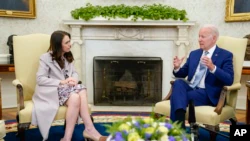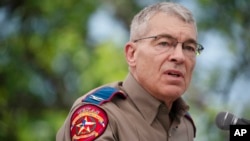The grieving town of Uvalde, Texas, began to hold funerals Tuesday for the first of the 19 children and two teachers who were shot to death May 24 by a teenage gunman who barged into their elementary school armed with an assault rifle.
The first funerals were set for two 10-year-old girls. One of them, Amerie Jo Garza, was described in her obituary as sweet, sassy and funny, a girl who loved swimming and drawing. The other victim, Maite Yuleana Rodriguez, was, according to her obituary, an honor student who loved learning about whales and dolphins and dreamed of becoming a marine biologist.
More funerals for the remaining victims are set in coming days, through mid-June.
In Washington, a handful of U.S. senators — Democrats Chris Murphy and Kyrsten Sinema, and Republicans John Cornyn and Thom Tillis — began virtual talks to determine whether agreement is possible on measures to curb a level of gun violence and mass killings that are unlike those anywhere else in the world.
President Joe Biden, a gun control proponent whose efforts to enact new controls on gun sales has been stymied by opposition Republicans, told reporters at the White House: “I will meet with the Congress on guns, I promise you.”
Biden, who spent seven hours Sunday in Uvalde visiting with the relatives of the victims and survivors of the attack, said, “I’ve gotten to more mass shooting aftermaths than I think any president in American history, unfortunately.”
“And it’s just, so much of it is — much of it is preventable,” he said. “And the devastation is amazing.”
Going into a meeting with New Zealand Prime Minister Jacinda Ardern, Biden said he would ask her about her country’s response after a gunman killed 51 people at two mosques in Christchurch in 2019, streaming the carnage on Facebook as it happened.
Within weeks, Ardern led a dramatic push to restrict firearms in New Zealand, including a permanent ban on military-style semiautomatic weapons and assault rifles and a program to buy back and destroy such guns already in circulation.
Such a plan would meet with widespread opposition in the U.S., where many people see the U.S. Constitution’s guarantee of gun ownership rights as sacrosanct.
While lawmakers debate new controls on gun sales, the Justice Department has opened a review of the police response to the attack on Robb Elementary School, “to identify lessons learned and best practices to help first responders prepare for and respond to active shooter events.”
In the Texas shooting, law enforcement officials are being sharply criticized for taking more than an hour to directly confront the gunman, Salvador Ramos, a high school dropout.
In the past few days, Texas law enforcement authorities have changed their accounts of exactly how the Robb Elementary massacre unfolded and their response to it.
Even as children trapped in the classroom with the shooter made urgent emergency calls, pleading with police to rescue them, the incident commander on the scene, the police chief for Uvalde schools, assessed — wrongly — that it was no longer an active shooter incident but rather that the assailant had barricaded himself in a classroom.
As a result, the incident commander, Pete Arredondo, did not immediately order police officers into the classroom to end the mayhem before more were killed.
Eventually, U.S. Border Patrol agents arrived at the school, burst into the classroom and killed Ramos.
The head of the Texas Department of Public Safety, Steven McCraw, said last week that with the benefit of hindsight, “it was the wrong decision” to wait to confront the shooter.
Some information from Reuters was used in this report.


